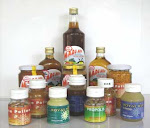The earliest information on using honey in children nutrition is dated to about 9 century BC. Ancient Germanic and Greek people gave milk combined with honey and melted butter. They put a few drops of honey into the mouth of a newborn before the mother began to nurse it. Modern paediatric literature corroborates the old medicinal method practised by ancient peoples and recommends to use honey in babies nutrition. Honey can be added to artificial woman's milk for feeding premature babies and also babies who are ill with jaundice and hypochromic anemia.
Honey is used for curing infections, constipation, nausea etc. Honey facilitates protein and lipid assimilation and makes casein precipitate in the form of small flocs, due to what babies stomach empties of the products within a minimal space of time. Child's organism needs high-calorie foods, because of its growth and agility. It is well-known that children are fond of sweet dainties- intuitive tendency to compensate the loss of energy. Honey, rich in calories and vitamins, is valuable for a young organism harmonic development and health maintenance.
Honey facilitates potassium and magnesium assimilation. Dark sorts of honey increase haemoglobin amount in blood, improve appetite and make children feel well. Honey fructose is metabolised better that milk lactose. Some babies can't metabolised saccharose, but honey is wonderfully assimilated, as its sugar doesn't need to be metabolised by the organism. Honey has laxative properties. Digestive systems of the children who are fed on honey works wonderfully, children have good appetite. Honey eases the appearance of teeth.
Many authors note honey antianemic properties especially honey of dark color, that leads to increase in haemoglobin in blood, to improving appetite and to gaining weight. Some sorts of fragrant honey have sedative effect on nervous children who fall asleep soon after they take some honey.
S. Mladenov refers to doctor's Tsais from Geidelberg words: "I've given bee honey to my children since their birth and they've never fallen ill".
N. P. Noirish, who observed 230 children aged 7-15 became sure of honey healthful influence on children's health. In his opinion children should be given 1-2 spoonfuls daily. The best way to give honey is to mix 15 gram of it with a glass of warm milk, that is very effective for curing constipation, anemia, night incontinence. It is advisable to mix honey into cottage cheese, porridges, drinks, herbs decoctions and infusions. Drinks have a pleasant taste, they are better metabolised, and their medicinal effect is higher.
M Frenkel advises to give small children a folk medicine against cough (especially against whooping-cough): a part of honey and a part of warm olive oil. A tea-spoonful of the mixture should be given several times a day.
E.A Ludyansky recommends to give children with various neurotic disorders honey baths (12-15 baths daily or every other day). The course can be repeated in 4-5 months. Supporting baths once a week can be prescribed. Honey baths can be combined with coniferous and sage baths. Contraindications for honey baths are honey intolerance, cardiovascular and pulmonary deficiency, blood diseases, diabetes, tumours.
K.A. Kuzmina recommends to include honey into the diet of children, ill with scrofula. She considers that honey helps them to recover, in contrast to the opinion that honey isn't advisable to eat during this disease. Exceptions are for children who have hypersensitiveness to honey. She says the same about children who suffer from diathesis. Honey is not contraindicated if there is no idiosyncrasy to it. ( that is intolerance, allergic reaction- the editor's remark). In order to determine hypersensitiveness to honey, it is necessary to give a child a small amount of it (half a teaspoonful) first. If there is no diathesis, rash, skin eruption or other symptoms of idiosyncrasy then you can give a spoonful of honey a day.
But one must see to it not to give a child too much honey as honey in large amounts can cause disgust.
Article source : www.mari-el.ru/homepage/nadir/honey_in_children.html
Langganan:
Posting Komentar (Atom)





Tidak ada komentar:
Posting Komentar